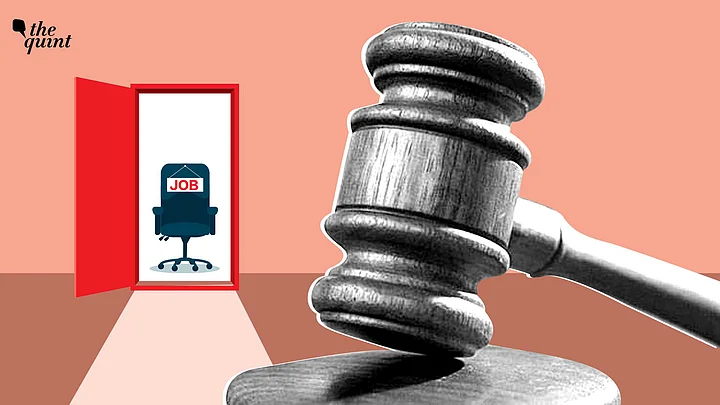On Firiday, 6 August, the Chief Justice of India NV Ramana-led bench of the Supreme Court pulled up the central government for the rising number of vacancies in various law tribunals across the country. The bench asked the centre to "clear its stand" on the urgent need to fill these vacancies.
"The concern is, we must know the clear stand on continuation of tribunals or closing of tribunals. The impression that we are gathering is, it seems that bureaucracy doesn't want these tribunals."Supreme Court
The Supreme Court has also warned that if the Centre fails to present an answer soon, top officials will be summoned before the court in person.
The problem of inadequate number of judicial officers at tribunals across India has not only irked the apex court but has also made litigation before such tribunals a herculean task.
Lawyers practising before various tribunals across the country told The Quint that the large number of vacancies have "virtually defeated" the very purpose of having such tribunals in the first place. Especially, tribunals such as Real Estate Regulatory Authority Tribunal, Debt Recovery Tribunal, and Central Administrative Tribunal are the worst affected.
Sorry State of Affairs
During the proceedings on Friday, CJI Ramana quoted data retrieved by the Supreme Court's registry, revealing the total number of vacancies – 20 presiding officers, 110 judicial members, and 111 Technical members – still pending across all tribunals.
The apex court refused to accept the reasons presented by the Solicitor General Tushar Mehta as the only causes behind pending vacancies.
"We have our own suspicions that some lobbies may be working to not fill these vacancies... Wherever Selection Committee have recommended names, they are mostly presided by sitting SC judges. You can make appointments immediately and make tribunals functional. The tenure, conditions, etc, are already settled by this court."Supreme Court
The court needs tough answers, and actual action being taken, it will not settle for nothing else. It very categorically told the central government that it will not let the people remain "remediless".
"If you don't want tribunals, allow us to restore the jurisdiction of high courts. If you want tribunals, fill up vacancies. People are entitled to go somewhere."Supreme Court
The Purpose of having Tribunals is Defeated
Rising vacancies at tribunals have severely impacted the adjudication of cases and the pursuit of justice.
Lawyers practising in different tribunals across the country believe that these vacancies have forced tribunals to function in a manner that defeats their intended purpose — speedy and efficient disposal of cases.
The purpose of having multiple benches of the same tribunal is nullified. Due to rising vacancies, benches are sitting only once or twice a week which has resulted in piling up of pending cases. For instance, National Company Law Tribunal (NCLT) matters from Jaipur are being handled by a bench in Chandigarh, which already has cases from four states and one UT falling under its jurisdiction.
"Technical members are generally retired government officers who are in a post-retirement job. The quality of judgements takes a beating and, therefore, most judgements are overturned in appeal."Yuvraj Samrat, advocate practising before tribunals in Delhi
Lawyers informed The Quint that the situation has gone from bad to worse at the Central Administrative Tribunal (CAT) and Real Estate Regulatory Authority Tribunal (RERA).
CAT is so overburdened that regular cases are getting adjourned with dates after 3-4 months! While in RERA Tribunals, benches often adjourn matters en masse (in bulk) as, due to the pending vacancies, adequate quorum is not met for hearing the case.
Suchindran BN, an advocate practising in tribunals as well as the Madras High Court, told The Quint that vacancies allow backlog to increase. The workload of many of the benches have doubled, which results in "mechanical" adjournment of cases due to paucity of time.
"Specialist lawyers can file new cases but after that they keep getting adjourned without any substantive movement in the cases. In most cases, one side usually profits by delay and takes advantage of the situation."Suchindran BN
Need To Overhaul the Process
The perspective of the lawyers appearing before the tribunal and that of the Supreme Court converge at one point — the process needs more streamlining.
"The processes to fill up vacancies begin only when a sitting member has demitted office. Ideally, this process should begin six months or a year before the date of retirement of a sitting member."Suchindran BN
Advocate on Record (AOR) Talha Abdul Rahman goes a step further and recommends that vacancies at tribunals should be filled up through competitive exams.
"Given the nature and number of vacancies, there is no reason why vacancies should not be routed through a public examination where rules of reservation (for equal representation qua gender, etc) can be applied."Talha Abdul Rahman
Rahman believes that vacancies pile up often due to disagreement with the names suggested or agreed upon by the judicial side. There can be several rounds of back and forth correspondence on this. Some judges may see this as uninteresting administrative work and things may remain pending at their end as well. Therefore, he moots a "single-window" system for making appointments to tribunals.
Lawyer Govind Manoharan argues that the executive acts like an "absentee landlord" when it comes to appointments, adding to the problem.
"Consequence to access to justice is fairly obvious: lesser the members, lesser the number of cases that get decided. This is no different from the issue of vacancies in courts. The thing is, we are already in too deep with tribulalisation and over-fragmentation of the administration of justice."Govind Manoharan
Now, the central government has a week's deadline to respond to the strict questions posed by the Supreme Court. The matter will next be taken up for hearing on 16 August.
